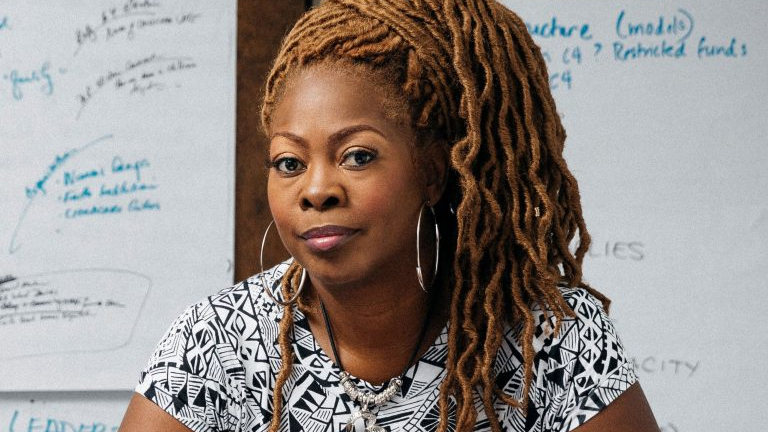By LaTosha Brown
“Our politics will not save us, but it will be our humanity. Our silence will not protect us, it will be our resistance. Our fears will never advance or evolve our nation, it will only keep us stuck and moving backwards.”
In this moment of national reckoning, Black people must see ourselves not just as defenders of our humanity, but as the visionaries and architects of a world yet to be born. For too long, we have pleaded with a nation to recognize what should never have been in question – our fundamental humanity. Today, I am calling for a shift in consciousness that moves us from defense to creation, from resistance to reconstruction, from surviving to reimagining.
We are witnessing an intense anti-Black campaign disguised as opposition to DEI, Critical Race Theory, and Black history. This is an attempt to erase us, our history, and our collective memory. But those who seek to silence us forget something fundamental – we have been meeting, gathering, strategizing, and convening for our freedom ever since we reached the shores of this nation.

Make no mistake: We are the architects of democracy in America. From Black visionary W.E.B. Du Bois’s pioneering scholarship to Black visionary Ida B. Wells’s fearless anti-lynching crusade, we have always been at the forefront of expanding what democracy means. We pushed this nation to make what exists on paper real and sustainable. But it’s not paper that gives us our value. We have value just by our presence on this planet.
We are builders of a dream that has yet to be realized. We believed in this nation when she was unable to believe in herself. There is no America without the 14th Amendment. There is no justice when racism shapes public policy.
As we embark on what Rev. Dr. William Barber calls “America’s third reconstruction,” we must ground ourselves in five essential pillars: Vision, Voice, Values, Victory, and Vote.
Vision: Black people have always been the visionaries, seeing beyond systems designed to limit us. From Black visionary Sojourner Truth speaking truth to power to the Black visionaries of the Movement for Black Lives reimagining public safety, we have consistently imagined societies more just and inclusive than what existed.
Voice: Once we have vision, we must speak it into existence with authenticity and the full authority of our lived experience. Too many of us have been told our voices don’t matter. This moment requires our full-throated truth-telling.
Values: Values are our compass when the path is unclear. Do we value people over profit? Community over competition? Justice over convenience? When our actions align with our values, we become unstoppable.
Victory: We must claim victories along the journey. Victory is when a first-time voter casts their ballot, when a community stops environmental racism, when a young Black girl finds her voice.
Vote: Look to the 1963 Freedom Vote in Mississippi, when over 80,000 Black Mississippians participated in a mock election in response to their disenfranchisement. This powerful act laid the groundwork for the Mississippi Freedom Democratic Party, led by Fannie Lou Hamer. They didn’t wait for permission to claim their democratic power; they asserted it.
Some suggest we are tired of protesting, marching, and fighting. Let me be clear: We aren’t tired of action—we’re tired of insufficient progress. We’re exhausted by trying to reform systems deliberately designed to create inequality, rooted in racism and white supremacy. We’re exhausted by constantly having to prove our humanity or justify our worthiness of equity and justice.
We never tire of taking care of our families, creating lives of safety, security, and joy. What we are tired of is systems that extract our brilliance while marginalizing us, institutions that proclaim justice while implementing barriers to advancement.
The real question isn’t whether to continue struggling—it’s how to transform our struggle from defense to innovation and creation. Black people must be visionaries, not just survivors. We must unapologetically stand in the fullness of our humanity, citizenship, and power.
We must be institution builders like Black visionary Dr. Mary McLeod Bethune, who founded a college with $1.50 and faith. We must be healers like Black visionary Fannie Lou Hamer, who established the Freedom Farm Cooperative. We must think differently about harm reduction like Black visionary Alicia Garza and the founders of Black Lives Matter. We must be the first line of defense for each other, like the Black visionaries of the Black Panther Party with their community programs.
We can no longer think just as citizens of a nation that we’ve pleaded with for 400 years to recognize our humanity. Instead, we must see ourselves as founders of a new nation yet unborn – one that understands that diversity is our strength, inclusion is our goal, and justice is our birthright.
This is not separatism but transformation. We are not leaving America; we are becoming the America that has always existed in our freedom dreams – the America that Black visionary Marcus Garvey envisioned through Black ownership, that Black visionary Ella Baker glimpsed when she empowered ordinary people to lead themselves.
The time has come to move beyond defending what should never have needed defense. On the dawn of America’s sesquicentennial (250th birthday), we will not accept anything less than what we deserve. We must build new systems and explore new ways of thinking, not just reform those designed to oppress us. The real opportunity is to assert our power and build something better for all of humanity.
LaTosha Brown is the co-founder of Black Voters Matter, which is dedicated to expanding Black voter engagement and increasing progressive power through grassroots movement-building.




